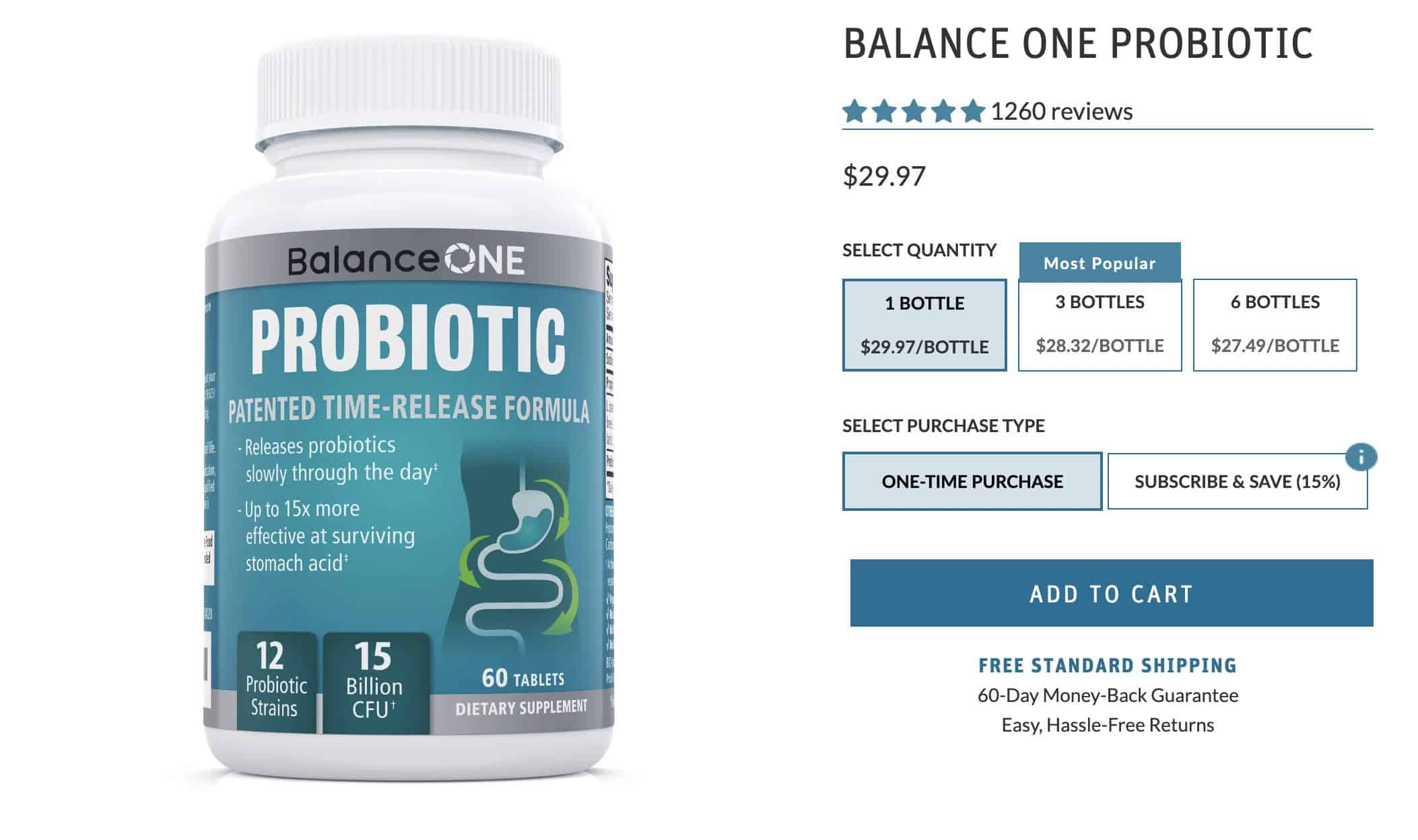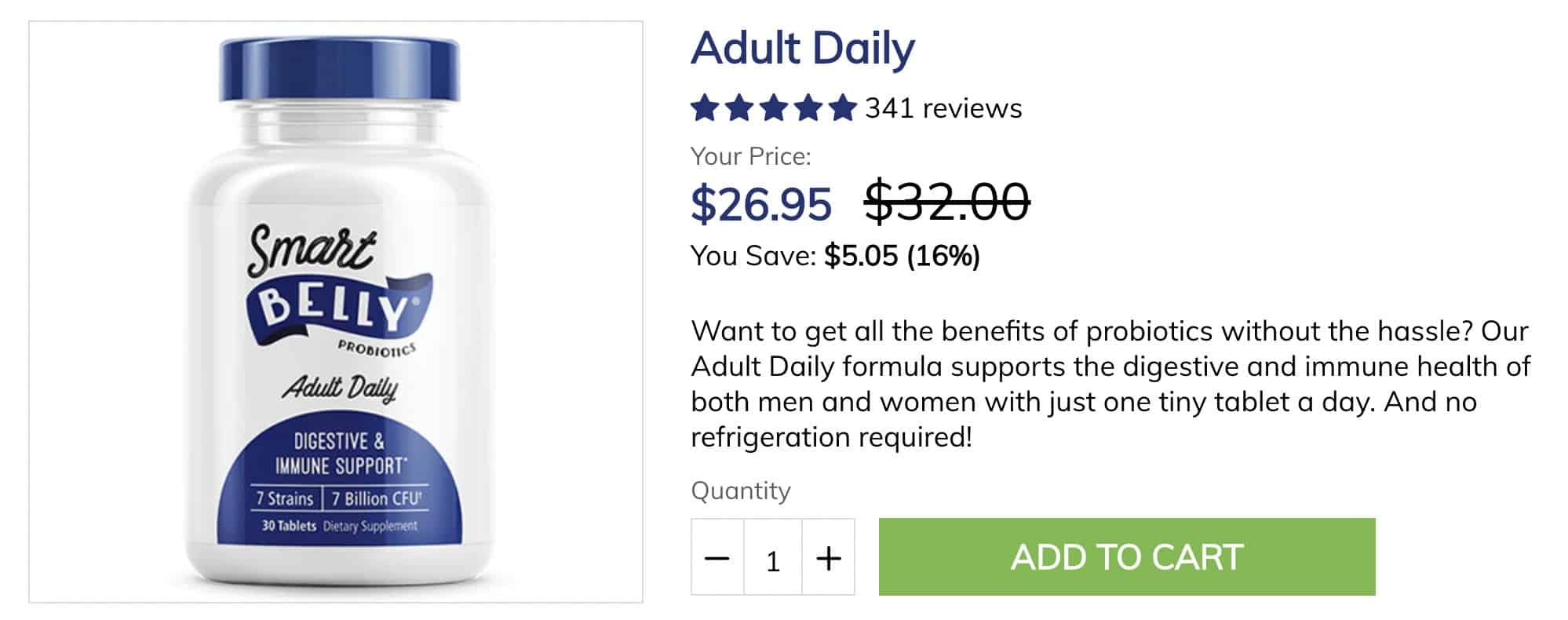You’ve probably heard that probiotics are a great way to boost your gut health. And indeed, they are! But how do you find the right probiotic for you? Where do you look? Which products are good and which are not?
Here’s an outline of what you need to look for when choosing the best probiotic supplement for you.
Choosing the Probiotic Supplement That Works For You
Find Out What Kind of Probiotic You Need
First of all, you should check off these five questions:
1. Will the Bacteria in the Probiotic Reach Your Gut?
A good probiotic should be designed in a way that allows the bacteria to survive the harsh acidic environment of your stomach. This means that the bacteria have a better chance of arriving at your intestines, ready to establish themselves and do their work.
That’s why you should look for a probiotic supplement that uses some form of time-release technology, such as BIO-tract or delayed-release capsules that protects the probiotic bacteria and prevents them from being broken down in your stomach.[1]
2. How Many Billion CFUS of Bacteria Do I Need?
CFU stands for “colony-forming unit.” This is the amount of live and active bacteria contained in each dose. Generally speaking, the higher the CFU count, the more effective the probiotic. However, not all products will state how many CFUs they contain, which can be a sign that the actual count is very low.
A good probiotic supplement should contain at least 10 billion CFUs for it to be effective or at least 5 billion CFUs for children.
3. Which Strains of Bacteria Does It Contain?
There are hundreds of different strains of bacteria, and all of them have unique properties. Some probiotics have been shown to help with specific health conditions. Most of the probiotics in commercial formulations are naturally found in a healthy gut.
Some of the best bacterial strains to look for in a probiotic are L. Plantarum (for protecting the membrane that surrounds your gut), L. paracasei (for its antibacterial properties that can ward off pathogens like E. coli and Candida albicans), and L. acidophilus (to regulate acidity in your gut and boost your immune system).
4. How Many Different Strains of Bacteria Are Included?
There are more than 1,000 different species of bacteria in a healthy gut. So, it’s best to choose a probiotic supplement that contains a variety of strains. All these strains work together, each supporting one another with their different properties. The more strains, the more work that gets done!
5. Are There Any Other Ingredients That Might Damage Your Gut Health?
Many supplement manufacturers include fillers and unnecessary ingredients to lengthen shelf life, sweeten their product, or make the contents easier to pour into capsules. Be sure to read the ingredients label carefully as some of these “extras” can be harmful to gut health.
Look out for common allergens, such as gluten, nuts, dairy products, or animal products, especially if you’re intolerant or allergic to them. Also, be aware that some gums (like those found in ‘gummy’ kids’ probiotics) can increase inflammation in your gut.
How to Choose for a Good Probiotic
Then, consider these factors that go into making a good probiotic:
1. Look Past the Numbers
First of all, try to look past the big numbers that are used in marketing. You’ll see adverts for probiotics that have 50 billion, 100 billion, even 200 billion CFUs! The harsh reality is that these numbers are usually irrelevant. Probiotics with high CFU counts often deliver only a few of those bacteria past your stomach acid. Time-release tablets, for example using patented technologies like BIO-tract, can deliver 15 times more bacteria to the gut than an equivalent probiotic in a vegetable capsule.[2]
For example, my preferred Balance ONE Probiotic contains 15 billion CFUs of bacteria. It uses time-release tablets, and each one of those tablets delivers the same amount of bacteria to your gut as a 225 billion CFU probiotic in a vegetable capsule.
2. Look For the Strains That the Probiotic Contains
A good probiotic for digestive health and immune support should contain at least 5 strains, and preferably 10. All of those strains have different benefits and characteristics. The more you take, the more benefits you’ll enjoy.
3. Watch Out For Unnecessary Sweeteners or Flavors
No one needs their probiotics to taste like candy! Many probiotics, and especially probiotic gummies, contain a range of sweeteners and other ingredients that can actually impair your gut health.
With all the criteria in mind, let’s dive into the 7 best probiotic supplements available in the market, together with my reviews to help you choose the best one for you.
7 Best Probiotic Supplements
1. Balance ONE Probiotic
This is one probiotic supplement that ticks all the right boxes. It contains 12 strains of probiotics with 15 billion CFUs per tablet. These include the most-researched strains, such as Lactobacillus Plantarum, Lactobacillus paracasei, Lactobacillus acidophilus, Lactobacillus casei, Bifidobacterium longum, Bifidobacterium bifidum, and more.
The Balance ONE Probiotic is also free from unnecessary fillers and allergens, such as nuts, dairy, gluten. It’s non-GMO and vegan, and it doesn’t require refrigeration, so it’s perfect for travel or keeping on your desk at work. It only contains strains that are already present in the human gut without any Soil Based Organisms (SBOs) or active yeasts.
The most important feature of the Balance ONE probiotic is its patented delivery system known as BIO-tract. This special patented process involves compressing the probiotic bacteria into tablets. This means that Balance ONE probiotics can survive passage through the acidic conditions of the stomach without being destroyed. Studies have shown that this delivery method gets 15 times as many bacteria past stomach acid compared to regular vegetable capsules.[3]
If you’re looking for a quality probiotic with high efficacy, Balance One is my number one choice.
2. Renew Life Ultimate Flora Extra Care Probiotic
This is a good probiotic that contains a wide variety of strains and a powerful dose. There are a guaranteed 30 billion live probiotic cultures, including 12 probiotic strains, which makes Renew Life Ultimate Flora Extra Care Probiotic a good choice for anyone seeking a starter probiotic.
It uses delayed-release vegetable capsules which, while not as effective as the BIO-tract system, are still an effective way to deliver bacteria to the gut. The rest of the specs check out too. It has multiple strains for effective support and is free from gluten, dairy, and soy.
30 Billion CFU Guaranteed, Probiotic Supplement for Digestive & Immune Health, Shelf Stable, Gluten Free, Extra Care, For Men & Women, 60 Capsules
3. Vitamin Bounty – Pro 25 Probiotic and Prebiotic
With 25 Billion organisms per dose, Vitamin Bounty is a good choice for a maintenance probiotic. It also has an impressive 13 probiotic strains to help support overall digestive health.
It’s also made with a delayed-release capsule that protects the live bacteria contained within each capsule from the stomach’s harsh environment. This helps in the delivery of the bacteria to the intestines and improves efficacy. There is also a huge range of strains plus a nice bonus of Fermented Greens, which help as a prebiotic.
13 Probiotic Strains, Gut Health, Digestive Health, Probiotic for Women and Men, Delayed Release Embocaps - 30 Capsules
4. Hyperbiotics PRO-15 Advanced Strength
Again, this formula is made with the BIO-tract patented delivery method. The probiotic contents are released over an eight to then hour period, which means they’re more likely to bypass the acidic environment of the stomach and move into the intestinal tract alive. It has the added benefit of New Zealand Kiwifruit powder, which functions as a prebiotic that helps the healthy bacteria colonize and supports digestion and regularity.
Like Balance One, Hyberbiotics Pro-15 has a guaranteed shelf life that doesn’t require refrigeration. It contains only strains that are already present in the human gut without any Soil Based Organisms (SBOs) or active yeasts.
60 Daily Time Release Pearls— Digestive Supplement Formula—15x More Survivability Than Capsules—Patented Delivery Technology—Easy to Swallow (2 Pack)
5. Smart Belly Adult Daily
This formula contains a selection of 7 well-researched lactobacillus and bifidobacterium strains, as well as a prebiotic. The CFU of Smart Belly Adult Daily is 7 billion, which is less than ideal, but it does use the patented Bio-tract delivery system so that the majority of those probiotic bacteria will survive stomach acid. It’s allergy-free and requires no refrigeration.
6. Garden of Life Colon Daily Care 50 Billion CFU
This well-known brand of probiotic boasts 50 Billion CFU per capsule with 15 strains of probiotic bacteria. This includes B. lactis HN019, a strain proven to help promote bowel regularity and help relieve bloating. Garden of Life Colon Daily Care also has the nice feature of a desiccant-lined bottle technology to support the shelf life of the probiotics, and it’s allergen-free.
The only concern with this probiotic is that it does not use an effective method to deliver its bacteria past stomach acid, so it’s hard to say whether those 40 billion probiotic bacteria are guaranteed to reach the intestines.
Dr Formulated 50 Billion CFU Probiotic + Prebiotic Fiber for Men’s Digestive & Immune Health, 15 Strains, Daily Constipation Relief, Gas & Bloating, 30 Capsules
7. Align Probiotics Digestive Probiotic
Last but not least, Align is designed to support digestive health. Its main feature is its inclusion of Bifidobacterium longum 35624, which the manufacturers claim will deliver 24/7 support to the gut.
This particular strain isn’t often seen in other products. If you’re suffering from IBS, this could be a good choice.
Probiotics for Women and Men, Daily Probiotic Supplement for Digestive Health, Helps Soothe Occasional Abdominal Discomfort, Gas, and Bloating 63 Capsules
The Bottom Line
There are so many probiotic supplements on the market that it can be difficult to make an informed choice. The health supplement industry is largely unregulated and many of the cheaper products tend to be of poor quality.
You can use the questions at the top of this article to determine if your probiotic is worth the money. If you need some further guidance, the probiotics listed in this article are all good choices.
To reap the best benefits of probiotics, I recommend you to read this too: When to Take Probiotics for the Best Health Benefits?
Featured photo credit: Paweł Czerwiński via unsplash.com
Reference
| [1] | ^ | The Candida Diet: How To Choose The Best Probiotic For Candida |
| [2] | ^ | Balance ONE: BIO-tract delivery system for probiotics |
| [3] | ^ | BalanceONE: 5 RED FLAGS TO LOOK FOR WHEN BUYING PROBIOTICS |



















































